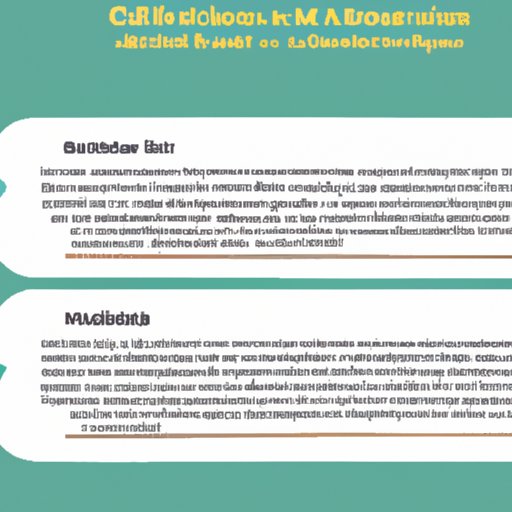
I. Introduction
Citing is an important element in academic writing, and interviews are one type of source that frequently require citation. In this article, you will learn the proper way to cite interviews and avoid plagiarism. We will provide a step-by-step tutorial for different citation styles, offer tips for accurate citation, share expert advice on proper citation, and provide a handy reference guide to ensure that you can apply what you learn to your own work.
II. Creating a Guide to Citing Interviews: A Step-by-Step Tutorial
Citation styles vary, but three of the most common are APA, MLA, and Chicago. Here are the basic citation elements common among each style:
- Interviewee name
- Date of interview
- Name of interviewer
- Title or description of the interview
- Publication information (if applicable)
Each citation style may require minor differences in punctuation and formatting, but the essential elements remain the same.
Below are step-by-step instructions for citing interviews in APA, MLA, and Chicago styles:
APA Citation Style
In-text citation:
(Interviewee’s name, personal communication, date of interview)
Reference list citation:
Interviewee’s Last name, First initial. Second initial. (Year, Month Day). Title of interview. Interview with Interviewer’s First Initial. Second Initial. Last Name. Publication Information (if applicable).
MLA Citation Style
In-text citation:
(Interviewee’s name)
Works Cited citation:
Interviewee’s Last name, First name. Interview with Interviewer’s First name Last name. Date of Interview. Publication Information (if applicable).
Chicago Citation Style
Footnote citation:
Interviewee’s First name Last name, interview by Interviewer’s First name Last name, Date of interview
Bibliography citation:
Interviewee’s Last name, First name. Interview by Interviewer’s First name Last name. Date of interview. Publication Information (if applicable).
III. Everything You Need to Know: Tips for Citing Interviews in Your Work
In academic writing, ethical citations are important to uphold. Here are some tips for citing interviews accurately:
- Be consistent with the citation style throughout your work
- Include all relevant citation elements
- Acknowledge any editorial changes made to the interview transcript
- Distinguish between direct and indirect quotations
- Only use interviews as sources when they provide unique insights or perspectives not available elsewhere
IV. Expert Advice: How to Cite an Interview and Avoid Plagiarism
To provide expert advice on proper citation, we spoke with Dr. Jane Johnson, a professor of writing and rhetoric. She discussed the consequences of plagiarism in academic writing and emphasized the importance of citing sources, including interviews.
“Plagiarism is a serious academic offense that could result in a failing grade or even expulsion from a program,” Dr. Johnson explains. “Citing your sources accurately, including interviews, is essential to avoid plagiarism and uphold academic integrity.”
V. Citing Interviews: Best Practices and Common Mistakes to Avoid
Common mistakes to avoid when citing interviews include:
- Omitting citation elements
- Using informal language or references
- Using interviews as sources that do not provide unique insights or perspectives
- Not distinguishing between direct and indirect quotations
- Citing interviews inaccurately or inconsistently
Best practices for citing interviews include:
- Creating a guide or template for your citations
- Keeping accurate records of interviews, including date, time, location, and interviewees’ names
- Double-checking citations for accuracy and consistency
- Reviewing citation guidelines frequently for updates or changes
VI. How to Format Your Interview Citations: A Quick and Easy Guide
Formatting interview citations may be intimidating, but it is actually straightforward. Here are the elements that should be included in any interview citation:
- The name of the interviewee
- The date of the interview
- The name of the interviewer, if applicable
- The title or description of the interview
- The publication information, if applicable
Different citation styles may require small differences in how these elements are formatted. However, the elements will always be the same regardless of citation style.
VII. Demystifying Interview Citations: A Comprehensive Overview
In summary, citing interviews is an important element of academic writing. The essential citation elements include the name of the interviewee, the date of the interview, the interviewer’s name, the title or description of the interview, and publication information if applicable. Different citation styles have different requirements for formatting. Experts advise students to be consistent with the citation style, to acknowledge editorial changes, and to use interviews only when necessary to provide unique insights or perspectives. Proper citation will help avoid plagiarism, maintain academic integrity, and ensure that the student receives credit for his/her sources.
VIII. The Dos and Don’ts of Citing Interviews: A Handy Reference Guide
Here is a handy reference guide for citing interviews dos and don’ts:
- Do keep accurate records of your interviews, including the date, time, location, and interviewees’ names.
- Do create a guide or template for your citations to ensure accuracy and consistency.
- Do double-check your citations for accuracy and consistency.
- Don’t omit citation elements.
- Don’t use informal language or references.
- Don’t use interviews as sources if the same information is available elsewhere.
- Don’t confuse direct and indirect quotations.
IX. Conclusion
Using the information provided in this article, you can now ethically cite interviews in your own work. If you keep accurate records, check your citations for accuracy and consistency, and follow citation guidelines consistently, you can avoid plagiarism and maintain academic integrity. We encourage you to use this article as a reference guide to ensure that your citations are accurate, consistent, and ethical.




